
Making use of AI is increasingly becoming a strategy for expansion. Most innovative business owners are looking for a variety of AI-based business concepts.
Many AI-based businesses use AI to transform our digital future across various industries, including healthcare, finance, robots, and natural language processing.
According to Tractica Research Forecast, by 2025, the direct or indirect applications of artificial intelligence will bring in $36.86 billion in income.
The above forecast represents a great business opportunity for entrepreneurs seeking to maximize their investment returns. Explore important aspects such as cost-affecting factors, development steps, tech stack, and others for building an AI startup in 2023 throughout the blog.
Therefore, look into the best AI startups in the market right now to find more about AI business ideas, suitable industries, and other important aspects.
- AI Market Size
- What Is Artificial Intelligence?
- How Does Artificial Intelligence Work?
- How AI Has Impacted Different Industries?
- Which AI sub-technologies should be included in your startup?
- Which domain will profit from AI technology?
- Revenue of top AI use cases
- Most profitable sectors for AI business
- How Businesses Can Make Money In AI?
List of top AI companies- How to start an AI business?
- What are the secrets behind successful AI startups?
- Conclusion
- FAQ
AI Market Size

Source: Statista
Given the current status of the AI sector, organizations have a fantastic chance to innovate, streamline operations, and gain a competitive advantage. To realize the potential of AI in their particular fields, organizations must adopt a strategic approach to AI adoption, considering issues like data protection, ethical concerns, and long-term sustainability.
The scale and scope of the AI market have grown significantly, and forecasts continuously show rising trajectories. The growing incorporation of AI into regular company operations and consumer applications is driving this expansion. Diverse technologies, such as robots, computer vision, machine learning, and NLP, are included in the worldwide AI market.
What Is Artificial Intelligence?
Artificial intelligence is computer systems that can do tasks that typically require human intelligence. A wide range of skills are required for these tasks, including learning, thinking, problem-solving, speech recognition, natural language understanding, and visual vision. Building robots that can mimic human cognitive processes and adapt to new surroundings and data is the aim of artificial intelligence (AI).
AI technology is widely used in various industries, including healthcare, banking, education, manufacturing, and entertainment. Artificial intelligence (AI) is becoming complicated as technology advances. This has both opportunities and challenges for privacy, ethics, and the impact of automation on society.
How Does Artificial Intelligence Work?
Artificial intelligence (AI) is the ability of robots to mimic human intelligence via integrating sophisticated algorithms, data, and computing power. Machine learning is an essential part of many AI systems, and the process incorporates several critical phases and approaches. An outline of how AI functions is mentioned below:
1. Data Collection
For AI systems to learn and forecast, much data is frequently needed. The sort of learning for which the system is intended can determine whether this data is labeled (supervised learning) or unlabeled (unsupervised learning). The caliber and variety of the data heavily influence the AI model’s performance.
2. Data Preprocessing
Raw data frequently contains useless, noisy, or incomplete information. To prepare the data for training machine learning models, preprocessing entails cleaning, converting, and organizing the data. For AI systems to become more accurate and effective, this phase is essential.
3. Feature Extraction
Features are certain aspects or properties of the data that the model utilises in machine learning to generate predictions. In order to train the AI model, feature extraction entails picking and representing pertinent information from the input.
4. Algorithm Selection
Different algorithms are needed for different AI jobs. The kind of available data and the task’s nature (classification, regression, clustering, etc.) determine which technique is best. Neural networks, support vector machines, decision trees, and other algorithms are examples of common machine learning algorithms.
5. Model Training
When an AI model is trained, labeled data is provided (in the case of supervised learning), and the algorithm is left to discover patterns and correlations in the data. In order to minimize the discrepancy between its predictions and the actual results, the model modifies its internal parameters throughout training.
6. Evaluation
The model gets evaluated using a different set of data—the test set—that was not utilized for training after training. The model’s performance is evaluated using measures such as F1 score, accuracy, precision, and recall. Ensuring the model generalizes adequately to fresh, untested data is the aim.
7. Inference
When the AI model is given new, anonymous input after training, it could make judgments or predictions. We call this method “inference.” Artificial intelligence models frequently have to respond quickly and make judgments in real-world scenarios.
8. Feedback Loop
AI systems with a feedback loop can be trained to improve over time. To adjust the model to changing patterns or trends, it must be retrained with new data and its parameters changed.
9. Deployment
The AI model is successfully trained and evaluated before being made available for use in real-world scenarios. Deploying a model involves incorporating it into systems, devices, or applications so that it can carry out the intended functions.
How AI Has Impacted Different Industries?
The advantages of artificial intelligence can be seen across a broad spectrum of industries. However, only a few can generate the most revenue by leveraging the power of machine intelligence.
Therefore, it will be best to be selective with the industries where you seek to start your business. The figures below highlight the selection of the best sectors that can benefit from machine-based automation.
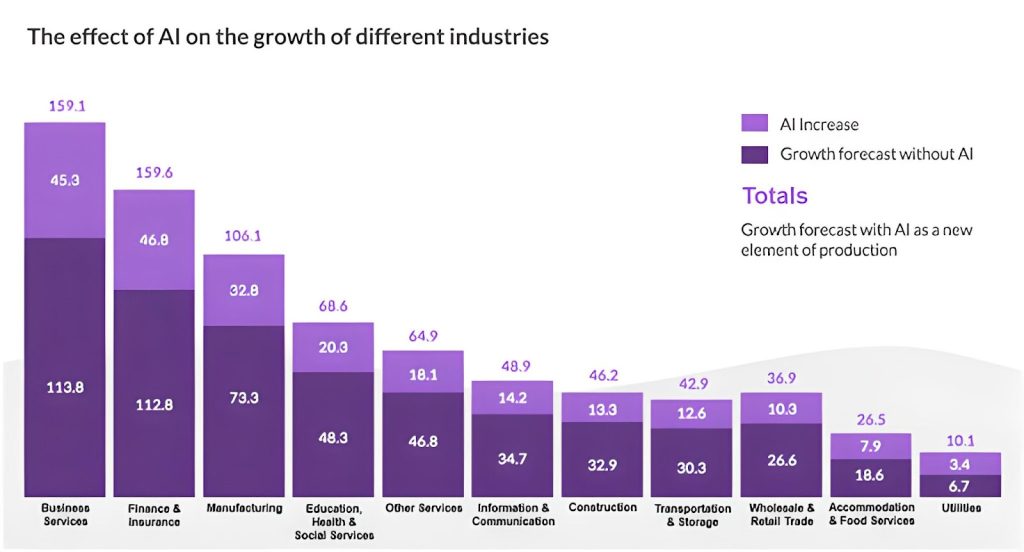
Source: PlantAutomationTechnology
1. Business Services
Among the routine and everyday tasks AI may automate are data entry, document processing, and customer support questions. Productivity increases and the workforce may be allocated to more demanding and worthwhile tasks.
2. Finance and insurance
AI systems can analyze data of large volumes to improve risk assessment. This is especially helpful for underwriting policies and setting rates depending on individual risk profiles in the insurance industry. Artificial intelligence (AI) systems can see odd trends and irregularities in transactions, which may be used to identify and stop fraud quickly. For financial organizations as well as insurance firms, this is essential.
3. Manufacturing
Artificial intelligence (AI) helps businesses streamline their supply chains by predicting demand, identifying potential disruptions, and suggesting efficient transportation routes. This might result in reduced expenses, faster lead times, and improved supply chain efficiency. Artificial intelligence (AI) can enhance quality control processes by using computer vision and image recognition to identify real-time defects. Ensuring that the items meet the relevant specifications reduces waste and improves overall quality.
4. Education Health & Social Services
AI can personalize education by assessing student performance data and modifying teaching tactics to fit each student’s learning preferences. Allowing students to learn at their own pace improves overall educational outcomes.
Artificial intelligence (AI) accelerates drug discovery by analyzing massive datasets to identify viable therapeutic candidates and assess their efficacy. This reduces the time and cost involved in bringing new drugs to market.
AI can assist with creditworthiness evaluations and student loan administration. This ensures an accurate assessment of student loan applications and makes providing more flexible and personalized financing options easier.
5. Other Services
AI has various effects on various service industries. While it has many advantages, such as greater productivity, cost savings, and enhanced consumer experiences, it also raises ethics, privacy, and AI implementation issues. Organizations in these areas must overcome these obstacles to use AI’s promise to improve services fully.
6. Information & Communication
AI integration in the information and communication industry offers improved user experiences, increased efficiency, and innovative thinking.
Artificial intelligence (AI) techniques, especially those based on natural language processing (NLP), increase search engines’ relevancy and accuracy, facilitating more effective and user-friendly information retrieval.
Artificial intelligence-driven language translation solutions enable smooth communication between speakers of different languages, promoting cooperation and information sharing worldwide.
7. Construction
AI integration might benefit the construction industry by increasing productivity, promoting safer operations, and using environmentally friendly practices. AI-powered cameras and sensors can identify potential hazards, track employees’ compliance with safety protocols, and monitor building sites to ensure safety standards are met. By analyzing sensor data, AI may help prevent equipment failures, streamline preventative maintenance, and save downtime.
8. Transportation & Storage
Because artificial intelligence (AI) enables autonomous automobiles to view their environment, make decisions, and navigate without human aid, AI is crucial to developing autonomous cars. This has an impact on both people and commodities transportation.
Using AI-powered robots and autonomous vehicles, many warehouse procedures, such as inventory management, picking, packaging, and shipping, may be automated to increase productivity.
9. Wholesale & Retail Trade
Artificial intelligence (AI) significantly influences the wholesale and retail trade sectors. AI is transforming many aspects of supply chain management, customer experiences, and operations.
To more precisely forecast demand, AI can examine past data, current market patterns, and outside variables. In doing so, wholesalers lower carrying costs, increase inventory levels, and lower their chance of stockouts or overstock scenarios.
AI optimizes inventory levels by analyzing sales patterns, seasonality, and supplier performance data. This helps stores maintain optimal stock levels, minimizes stockouts, and reduces carrying costs.
10. Accommodation & Food Services
AI integration in the hospitality and culinary industries offers chances for innovation and uniqueness, increasing productivity and customer satisfaction.
Chatbots with AI capabilities may answer questions from clients, help with reservations, and offer details on facilities, rules, and lodging.
Artificial intelligence (AI) systems can forecast popular menu items, optimize inventory levels, and minimize food waste by analyzing past sales data and external variables. AI may also evaluate consumer preferences to provide tailored menu recommendations, enhancing the eating experience.
11. Utilities
By utilizing AI, the utility sector could experience increased reliability, cost-effectiveness, and sustainability. AI is expected to greatly impact utilities, including water, electricity, and other public services. AI algorithms can assess data from smart meters, sensors, and other devices to improve energy distribution, reduce inefficiencies, and prevent power outages.
Which AI sub-technologies should be included in your startup?
Many companies are using artificial intelligence in their services and applications. Artificial intelligence consists of a broad range of technologies miming the cognitive functions humans can associate with.
However, regarding revenue generation and benefiting businesses with artificial intelligence, Deep Learning, and Machine Learning are the two major subfields.
Also, as per research conducted by Allied Market Research, machine learning will be the top source of generating revenue for a machine intelligence startup, followed by NLP and Image Processing technologies.
However, it would benefit you to add significant sub-technologies to your business.
- Machine learning
- Deep learning
- Virtual agents
- Decision management
- Natural language generation
- Natural language understanding
Which domain will profit from AI technology?
It is the individual business domain where artificial intelligence is making tremendous contributions. Their impact on business models is not limited to specific job areas, although it glorifies multiple business domains.
Here are the domains where artificial intelligence can generate the most revenue.
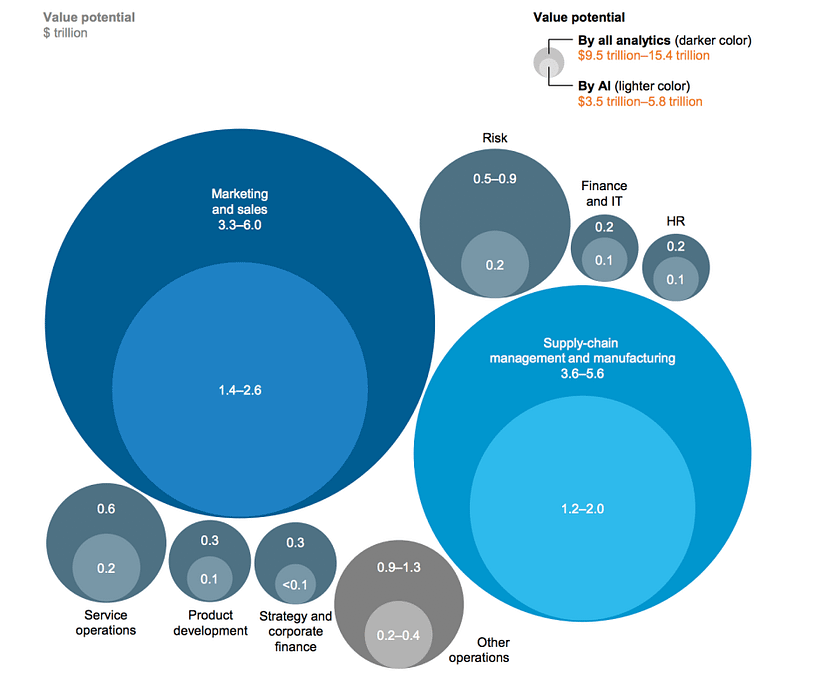
Source: Mckınsey
If you decide to offer enterprise-level AI solutions, then covering these domains will positively impact your business revenue.
Revenue of top AI use cases
When we discuss adding automation to a system, we discuss different use cases surrounding artificial intelligence in the business ecosystem.
Here is the popular use case for start-ups to generate massive revenue for their parent company with artificial intelligence.
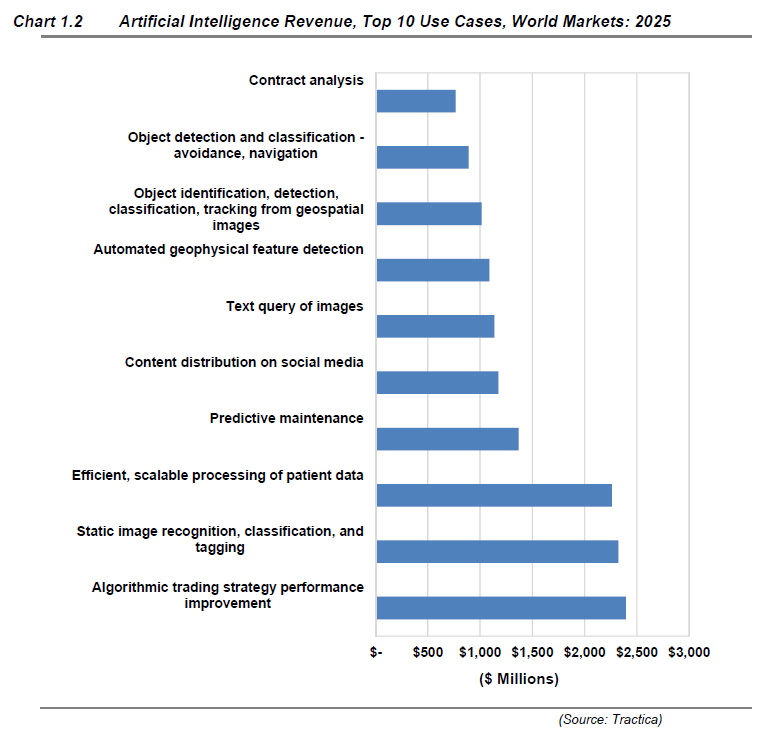
Source: Tractica
The above graph shows that around 60% of cases are based on big data and 40% on images and object recognition. The data indicates that companies offering either of the two services will experience steep growth in the coming time.
Now let’s explore the best ideas for your business.
Most profitable sectors for AI business
Explore the best sectors given below:
1. Healthcare
There are numerous use cases of artificial intelligence in healthcare start-ups.
The role of machine intelligence in the healthcare domain is massive, ranging from automation in EHR to scheduling appointments for doctors or health tracking for patients.
Best AI startups in the healthcare industry:
- Arterys
- Butterfly Network
- Caption Health
- Cleerly
- CloudMedX
- Corti
- DeepMind
- Enlitic
2. Cybersecurity
A combination of automation and security will grab investor attention in the coming years. Artificial intelligence is helping businesses to tackle hacking and breaching-related issues.
Businesses are using automation technology to track the change in the patterns of their users, abnormalities in the user journey, incorrect PIN entries, etc.
As the rising number of cyber attacks is giving nightmares to business leaders and entrepreneurs, there is a massive demand for integrating machine learning into digital infrastructure to boost overall security.
Best AI startups in cybersecurity solutions:
- Crowdstrike
- Cybereason
- SparkCognition
- Tessian
- Palo Alto Networks
- Check Point Software Technologies
- Darktrace
- Fortinet
3. Energy Sector
Artificial intelligence in the data-driven energy sector focuses on improving forecasting, trading accessibility, and efficiency.
The wide application of artificial intelligence in the energy sector revolves around electricity trading, intelligent energy storage, energy storage, vacillation, intelligent power consumption, etc.
Best AI startups in energy solutions:
- Octopus Energy
- DeepMind
- Stem
- SparkCognition
- Nest Labs
- ClimcaCells
- Tibber
- Autogrid
- Hank
4. Fintech
There are multiple use cases of artificial intelligence in fintech start-ups. From payments to fraud detection, machine intelligence is making a massive contribution to this sector. For entrepreneurs looking to enter the financial domain, this is the right time.
Best AI startups in fintech solutions:
- Kreditech
- Walnut Algorithms
- Lingxi
- Numerai
- Active.ai
- Skyline AI
5. Smart Home Management
The basic idea behind implementing machine intelligence is to automate home management. There are many examples, such as Amazon Alexa and other smart gadgets that work on users’ voice commands.
Integrating machine intelligence with IoT can be one of the most innovative combinations for your startup.
Best AI startups in smart home management:
- Rokid
- Softbank Robotics
- Nest Labs
- Sense
- Josh.ai
- Sighthound
6. Marketing
The marketing field is complex, and it requires time and patience to track the competitor’s move and the innovative ways that help to improve brand visibility.
With the help of advanced data and machine intelligence, businesses can predict the success of their marketing campaigns.
Systems can automatically analyze the market performance of a company and provide product marketing strategies.
Best AI startups in the marketing industry:
- 6sense
- Bluecore
- Near
- Invoca
- People.ai
- Placer.ai
- Zappi
- Appier
- Conversica
- Jasper
7. Retail Industry
AI can be applied to many retail businesses, such as offering personalized recommendations, virtual assistants, price optimization, predictive analytics, etc.
Businesses can offer their machine intelligence-based solutions to retail shops and e-commerce platforms to help them deliver their users the best shopping platform experience.
Best AI startups in the retail industry:
- Trax
- Standard Cognition
- Trigo
- Sentient Technologies
- Presto
- Peak
- Bear Robotics
- Bossa Nova Robotics
8. Entertainment
Many start-ups have entered the glamorous entertainment industry, offering machine intelligence-based products and solutions.
Whether image recognition or voice-based virtual assistant, integrating machine learning into entertainment platform are helping firms offer their users an enhanced experience.
It becomes hard to imagine that entertainment platforms go well without artificial intelligence, especially for recommending personalized content to users.
Best AI startups in the entertainment industry:
- AthenasOwl
- A+ Kids
- Aiva Technologies
- Genus AI
- Bookscribs
Get inspired by the list of best companies and startups that have started their business around machine intelligence.
How Businesses Can Make Money In AI?
Artificial intelligence (AI) can be a lucrative business venture, offering various opportunities across various industries. The strategic integration of AI into various aspects of business operations presents multiple opportunities for revenue generation, ranging from product development to service offerings and data monetization.
Here are five key ways businesses can make money in AI:
1. AI Product Development
Companies can earn money by creating and offering AI solutions that cater to certain market needs. This can include platforms, tools, or software with AI built in for jobs like cybersecurity, customer relationship management, or data analytics.
Also, creating unique AI solutions to satisfy every customer’s demands might prove to be a profitable business move. For businesses seeking customized AI solutions, this may mean developing original machine learning models, computer vision systems, or natural language processing applications.
2. AI Services and Consultancy
By offering training courses and continuous assistance with AI deployment, companies can be sure that AI technologies are being used efficiently. This might involve providing support services to handle any problems or queries that may come up as well as teaching staff members on how to use AI technologies.
Using and blending AI technology with current business procedures might include assisting companies in using AI for activities like decision-making, automation, and optimization, which would increase productivity and efficacy.
3. Data Monetization
AI can be used by businesses to analyze data for insightful information. Organizations can find trends, patterns, and correlations in massive datasets by using machine learning algorithms to examine them. This knowledge can then be shared with other organizations or stakeholders.
Offering curated dataset access may be a profitable business strategy. Businesses may supply high-quality datasets for various uses, like training machine learning models, by aggregating, cleaning, and annotating data.
4. AI In Specific Industries
Artificial intelligence (AI) presents the distinct potential for enterprises to make money by addressing particular demands and issues within specific industry sectors. Here are a few examples of how companies in specific industries might profit from AI:
I. Healthcare Solutions
- Diagnostic Tools
- Predictive Analytics
- Personalized Medicine
II. Financial Technology (FinTech)
- Fraud Detection
- Algorithmic Trading
- Credit Scoring
III. Manufacturing and Industry 4.0
- Predictive Maintenance
- Quality Control
- Supply Chain Optimization
IV. Retail and E-Commerce Optimization
- Recommendation Engines
- Dynamic Pricing
- Inventory Management
V. Agriculture Technology (AgTech)
- Precision Agriculture
- Crop Monitoring
VI. Legal Technology (LegalTech)
- Document Analysis
- Legal Research
List of top AI companies
Explore the best businesses and products that are leveraging the power of machine-based intelligence to create their products and services.
1. IdeaUsher
Idea Usher is a leading AI development company specializing in creating solutions powered by artificial intelligence. The company aims to solve specific business challenges or enhance existing processes by developing applications, systems, or platforms that leverage machine learning, natural language processing, computer vision, and other AI technologies.
The IdeaUsher employs an Agile approach for an iterative and flexible development methodology, allowing them to respond to changing client needs and project requirements, fostering a collaborative development process.
| Founder | Nitish Garg |
| Year founded | 2013 |
| Location | San Francisco Bay Area, Silicon Valley, West Coast |
| Funding | N/A |
2. Open AI

The company, headquartered in San Francisco, was founded by Elon Musk and Sam Altman in 2015. Open AI Is a research company that aims to create AI-based products such as Gym, Robo Sumo, Dactyl, Debate Games, etc. Moreover, Open AI has managed to run the fifth most powerful supercomputer in the world.
| Founder | Elon Musk and Sam Altman |
| Year founded | 2015 |
| Location | San Francisco, CA |
| Funding | $1B (Corporate Round |
3. Move works
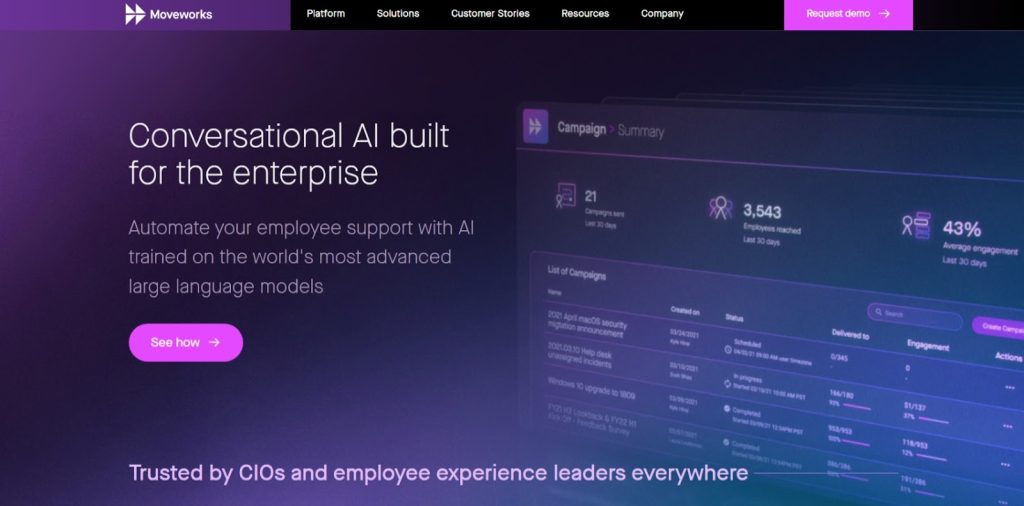
The platform that helps employers to create a better workplace. Movework supports employees’ end-to-end issues by utilizing the power of natural language understanding, probabilistic machine learning, and conversational AI.
| Founder | Bhavin Shah |
| Year founded | 2016 |
| Location | Mountain View, CA |
| Funding | $305M (Series C) |
4. H2O.Ai
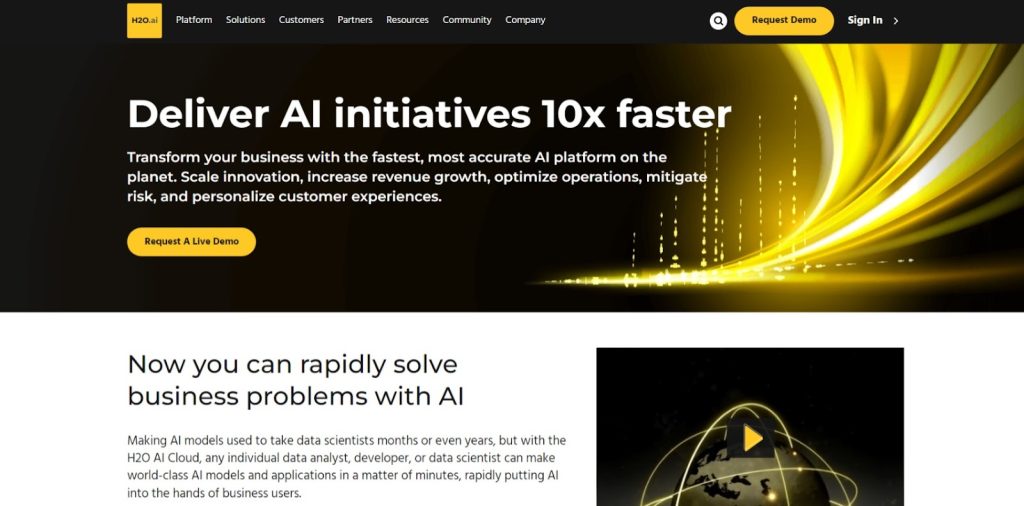
It is an open-source platform that allows developers to import algorithms across different use cases. With the help of H20.Ai, users can build predictive models and access rich analytics reports to improve their organization even further.
The platform has many customers across different industries, including retail and manufacturing. It uses cases such as fraud prediction, simplifying customer journeys, etc.
| Founder | Sri Ambati |
| Year founded | 2012 |
| Location | Mountain View, California |
| Funding | $251.1M (Series E) |
5. DataRobot

The platform enables its customers to utilize the power of artificial intelligence across multiple use cases, such as cutting business operational costs, access to robust analytics, deploying prediction models, etc.
The DataRobot has received over $700 million from leading businesses, including Lenovo, Humana, Kroger, and Lending Tree.
| Founder | Jeremy Achin & Tom de Godoy |
| Year founded | 2012 |
| Location | Boston, Massachusetts |
| Funding | $1B (Series G) |
6. Argo

The business aims to create a fully integrated self-driving system that consumes the power of machine intelligence into its maps, hardware, and software. Its super intelligent LIDAR system builds real-time models of roads and obstacles to help self-driving cars navigate.
| Founder | Bryan Salesky |
| Year founded | 2016 |
| Location | Pittsburgh, PA |
| Funding | $3.6B (Corporate Round) |
So, how to proceed with AI business? Let’s understand in detail.
How to start an AI business?
The detailed steps to start your AI business are as follows:
1. Pick the right Industry
Performing effective market research will enable you to select the best industry having great earning potential with AI development.
However, to simplify your research journey even further, we recommend you explore the below industries and pick the best one for your business.
- Cloud computing
- Healthcare
- Vehicle/Transportation solutions
- Security solutions
- E-Commerce
- Financial
- Education
- Manufacturing/Engineering solutions
- Energy/Environment solutions
- Robotics
- Entertainment
2. Create a detailed business plan
Having a business plan is essential to ensure your business based on machine intelligence is on the right track. A successful business plan involves multiple things, such as:
- Understanding the demands
- Creating goals and milestones
- Researching future requirements
Try to have a plan for the first three and five years of your company’s strategy.
3. Highlight your business mission
Knowing how your business will solve a particular challenge with the help of machine intelligence is essential. By highlighting your business mission, you can ensure your business is moving in the right direction.
Performing effective audience and competitor research will help you discover the opportunities you can benefit from by starting your business.
4. Understand your customers
Know your customers through different marketing practices, such as by taking interviews and surveys to discover their challenges and pain points.
Figuring out what your customers want will help you to create a successful business that can fulfill all the significant demands of your customers.
Ask the following questions to get a clear image of your potential customers:
- Who are my customers? Are they corporations or individuals like you and me?
- What exactly do they do for a living?
- Where do they live?
- What are their ages?
- How much money could they spend on things like mine?
- What do they think about the products of my competitors?
5. Hire AI developers
To create your products based on artificial intelligence, you will need help from developers having expertise in machine intelligence development. The most important thing is to stop assuming you can do everything yourself.
Therefore, it becomes essential for you to create the right business team that will include all the required professionals, such as software developers, project managers, marketers., etc. Know the full process of hiring AI developers in detail.
If you are new to the business and don’t have experience in establishing the right team. We recommend you outsource your project to a software development company.
Project outsourcing will enable you to simplify your business creation journey and get maximum returns on your investment, as development agencies have experience with their past projects.
6. Add data storage as part of your business
Machine intelligence needs massive data to improve further. Therefore it doesn’t matter what kind of startup you are working on; data storage will always be an essential part of your business.
Data helps machine learning to learn new things and improve their functionality.
By partnering with an AI development agency, they can help you to create a robust data strategy that enables you to implement long-term scalability for your business.
7. Select AI tech stack
Careful selection of the right tools and technology is essential for building successful products and services. The tech stack normally involved in developing automation-based products is as follows.
| Expertise | Tech Stack |
| DL Frameworks | PyTorch ,MXNet, Nvidia Caffe,Caffe2, Chainer, Theano |
| Modules/Toolkit | Microsoft Cognitive Toolkit, Core ML, Kurento’s computer vision module |
| Libraries | OpenNN, Neuroph, Sonnet, Tensorlfow, Tensor2Tensor, tf-slim |
| Algorithms | Supervised/unsupervised learning, Clustering (density-based Hierarchical, partitioning), Metric learning,Few-shot learning |
| Neural Networks | CNN, RNN, Representation learning, Manifold learning, Variational autoencoders, Bayesian networks, Autoregressive networks |
8. Create MVP of your ML-based product
To speed up your business creation; we recommend you go with the MVP of your product. MVP is a minimum viable product with only a list of selected features and functionality to make a product ready for use.
MVP will help you modify the final version of the product based on beta users’ feedback. Helping you to improve product quality even further.
9. Grow your AI business with effective marketing
Having a massive customer base for your product can be the only way to make your business profitable in the long run.
Therefore, it becomes essential for you to create and execute an effective marketing strategy to promote your business among your target audience.
Working with a creative marketing genius can help you promote your business with their successful marketing strategy.
However, many app development agencies have their own marketing team that can help you with promoting your business.
What are the secrets behind successful AI startups?
The combination of access to data sets and capabilities is the only reasonable answer to how AI firms can succeed.
1. Data sets
The capability of making money ultimately depends on the data set to work with. However, it is hard to gather data, and the only way to tackle this challenge is to partner with other companies.
Several tech giants have partnered with different businesses and industries, or even enterprises, to get data for them and then analyze it.
2. Domain expertise
Performing in-depth research on a specific industry is the way to gain expertise and knowledge. You will be able to identify areas of improvement where automation can bring massive innovation when you know an industry inside out.
3. Skilled AI talent
AI engineers and researchers will be the ultimate source that will drive your business based on artificial intelligence.
The more skilled members you have in your team, the greater the chance you will succeed in your business by coming up with innovative ideas and building top-notch machine intelligence-based products.
To pick up the right skill set for your business. Get in touch with engineers with years of expertise in developing products and delivering AI-based solutions.
Conclusion
Artificial intelligence has become a crucial technology for businesses in the competitive and modern era.
By implementing artificial intelligence, companies can streamline their operations, such as improving the decision-making process and smoothing their operations.
You can give a competitive advantage to your business by working with our team and getting proven solutions with AI development and implementation.
We are a team of AI developers who will work with you by closely analyzing your business and elevating them with the power of AI. Our team uses the latest technology and best development practices to ensure your digital platform is secure, scalable, and user-friendly.
Call us today to learn more about how we can help you unlock the full potential of your business with AI development.
Contact Idea Usher
Email:
Phone:
FAQ
Q. What problems does AI solve in business?
A. The technology solves the following problems:
- Customer support
- Data analysis
- Demand forecasting
- Fraud
- Image and video recognition
- Predicting customer behavior
- Productivity
Q. Which industries will benefit most from AI?
A. The following industries will benefit by using machine intelligence:
- Business services
- Finance & Insurance
- Manufacturing
- Education & health
- Information & communication
- Construction
- Transportation & storage
- Wholesale & Retail
- Accommodation and food services
- Utilities
Q. What are some good AI startup ideas?
A. The best ideas are as follows:
- Healthcare startups
- Security solutions
- Energy sector system
- Fintech startup
- Cyber security startups
- Smart Home Management
- AI marketing startups
- AI-based retail start-ups






Gaurav Patil